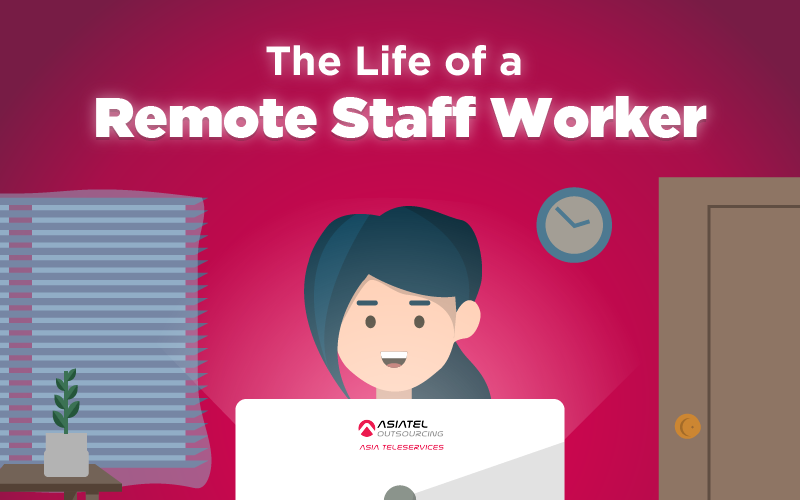When someone hears “Remote Staff/Worker”, instantly a face of envy and preconceived notions would pop out. They would envy you because if you’re a remote worker you don’t need to battle traffic and office issues as you can work the minute you wake up. Also, you’d hear misconceptions like decreased productivity and such.
The truth is remote working/staffing, aka as telecommuting is the present of the workplace. According to TalentLMS Remote Work Survey, 85% of remote workers chose to be one for reasons of increased productivity, greater autonomy, and flexibility. Who doesn’t want those, right?

But remote working may sound a dream work condition for most people, but it also has its own drawbacks and disadvantages. You may have heard of a lot of positive testimonials and statistics about remote work but it is obviously not for everyone.
Though every remote worker varies working conditions according to mutual agreement between the employee and the company, let’s take a look at their usual life.
1. Yes, it’s true. They don’t need to make two hours allowance before work for preparation and transportation (traffic congestion) unlike most of the office workers. No hassles even if there’s a storm outside. Who wouldn’t love the fact that you can work in an environment you also call your home? Most of the respondents (on the survey above) said that they prefer working in their own dedicated home office and second in their own living room and the bedroom was only third on the list.
No wonder 88% of them recommend working remotely. But not all remote workers work at home, some prefer working at coffee shops, other places where they are comfortable (and has a WIFI, of course) or some even work while they travel to places. If they miss the office vibe, they can opt to work at co-working spaces. Some also just work for a few days depending on their workload and contract. This is how remote workers have ‘more’ time because of the flexibility it gives them.
2. Most may think that remote workers don’t have a fixed time and just work whenever they like, but 60% of respondents from the same survey mentioned above that they still have to follow a 9-5, 5-days-a-week work schedule.
3. Remote working sometimes also means working alone, so loneliness is like their regular visitor. They may be safe from office drama and awkward small talk at office pantry, but loneliness can kill productivity. What they do is they rely on their ears to stay focused on what they are doing. Some even turn on their TV, listen to music just to feel attended.
4. Another study (Sure Payroll) said that 86% of remote workers prefer to work alone for productivity. Before judging them with misconceptions like remote workers just want to avoid responsibilities, make sure to know their top reason why they prefer this kind of setup.
5. Most of the remote workers do not just work remotely for the entire span of their ‘stay’ in the company. Sometimes they need to visit the office once in a while. Some do it regularly to avoid one of the main problems of remote workers have which is the feeling of being left behind. After all, they are still part of the company and its culture. No one wants the feeling of being left out.
6. The absence of a physically present supervisor makes the remote workers somehow choose when to start the ‘actual work’ if they’re still feeling lazy. They can do yoga, or watch an episode of their favorite TV series or just basically do the things that spark productivity without a supervisor or nosy co-workers policing them.
FlexJobs’ study said that remote workers get more sleep, eat healthier and exercise more. Imagine balancing life and work, that’s a skill!
7. Remote workers excel at communication. Since they are not physically present, they often rely on Skype or Outlook for urgent tasks, messages and a little chitchat with their co-workers. Who said that working remotely would stop you from being friends with your co-workers?
In order to succeed in remote working, one must know how to communicate effectively.
Thanks to technology, it indeed makes the world smaller and more comfortable in terms of professional aspects. Proximity is now not an issue when it comes to working as they can still use a lot of communication tools and apps.
It may sound ideal, but the fact is it is not for everyone proves that remote working is not as easy as everyone thinks it is. It still takes skill and effort just like how office workers exert theirs.
